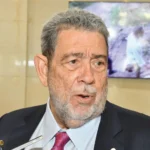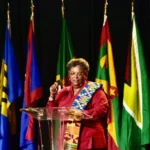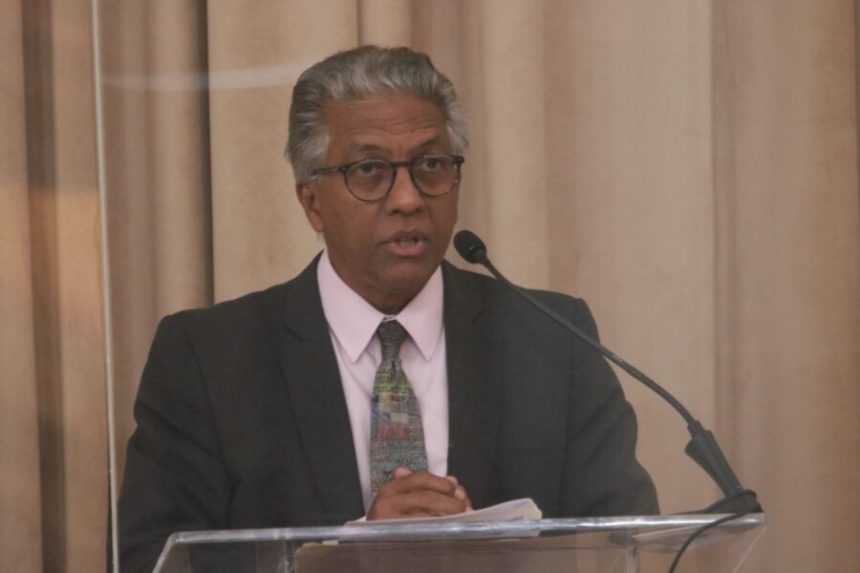Attorney General Reginald Armour has apologised to the Barbadian government and the Royal Barbados Police Force for the slur cast on that island’s police force, following its assistance to the T&T Police Service in seeking to bring Brent Thomas to justice.
Deputy Director of Public Prosecutions George Busby had also advised TTPS officers involved to communicate the existence of warrants to Barbados authorities, but no advice was given as to how the rest was to be done in Barbados or how, if arrested, Thomas was to be returned to T&T.
This was revealed by Armour in a statement to Parliament yesterday on the matter involving firearms dealer Thomas and the April 25 judgment by Justice Devindra Rampersad.
Armour spoke amid no less than 22 loud objections from UNC MPs, who protested that his statement was sub judice due to the State’s appeal of the judgment.
Justice Rampersad delivered findings in favour of Thomas, including what he called an “abduction” from Barbados.
At the centre of certain TTPS investigations in 2022, Thomas was rearrested on October 5 in Barbados, where he was in transit to Miami. T&T and Barbados police were involved.
The State last Friday appealed Rampersad’s order. Armour said a further appeal was lodged yesterday before the court to have it heard urgently “for national security reasons and to correct the grave errors made by the trial judge.”
Armour confirmed the State has English attorneys in place in the event it needs to protect T&T at the Privy Council level.
Following Rampersad’s judgment, Barbados Attorney General Dale Marshall sought answers on the issue from the Barbados Police Service (BPS). Marshall reported on his findings on Tuesday.
Yesterday, Armour said he accepted and endorsed Marshall’s remarks, adding, “I offer to the government and the Royal Barbados Police Force, my apologies for the slur which has been cast on the action of the Royal Barbados Police Service who, consistent with the law and their oaths of office, were assisting the T&T Police Service to the best of their ability in the investigation of alleged crimes, in seeking to bring an alleged fugitive to justice.”
Armour detailed the State’s areas of appeal but minus what the State’s counsel will present on its behalf.
Armour said he was limited in what he said. “Nevertheless, I make this statement because I recognise and acknowledge the legitimate concerns which arise out of that matter, exacerbated by the judgment. Nothing that I say here falls outside our permitted hierarchical judicial structure, tiered to include within the hierarchy of our Supreme Court that judges at first instance may make errors in the discharge of their judicial functions, and the Court of Appeal exists to correct those errors.”
Armour said the matter raises consideration of national security which circumscribes the detail which he could outline, and it also concerns police operational systems and processes in which the Executive has no role. He said the Police Commissioner ordered a probe of the matter and that must be allowed to take its course.
Emphasising that the Executive played no role in the events giving rise to the judgment, Armour said his information came from instructions given by the police to the team of attorneys representing the Office of Attorney General as a defendant in the matter. He noted the matters to which the judgment speaks are of a police operational one.
Tumultuous UNC protests
Giving a summary of the appeal, Armour said he would not comment on the arguments to be made by counsel to his ministry.
“Except to say that, so urgent is the need for a definitive final appellate adjudication in this matter, that I have already given instruction to London solicitors to retain English counsel from the outset so that that counsel may become immediately and fully apprised of this matter, working with our team of local attorneys, so as to become fully up to speed, ensuring that howsoever this appeal is determined by our Court of Appeal, we are ready immediately to protect the State by urgent access to our final court of appeal–the Privy Council.”
UNC MPs Saddam Hosein, Dinesh Rambally, Rodney Charles, Opposition Leader Kamla Persad-Bissessar, Arnold Ram and others protested that Armour was abusing Parliament’s Standing Order to speak about the appeal and judgment, prejudicing the matter, criticising and quoting the judge.
They were overruled by Deputy Speaker Esmond Forde, who noted Armour’s statement was approved.
Prime Minister Dr Keith Rowley also rose several times to challenge UNC MPs.
At the conclusion, Armour declared, “It is pellucid—I haven’t offended the Standing Orders.”
Deputy DPP advised TTPS on arrest warrants
Attorney General Reginald Armour, noting the judgment’s finding that Brent Thomas was “abducted” in Barbados, said the State conceded Thomas’ return was unlawful, having been effected outside the extradition process.
His ministry’s Central Authority was not consulted for advice and that aspect of the matter is not being appealed.
But citing an error by the judge in terms of his claims of an “abduction,” Armour said there can be no offence of abduction involving criminal intent, unless such criminal intent was shown, beyond a reasonable doubt, to have been present in TTPS officers’ minds.
“Criminal intent is necessary to justify a conclusion of the criminal offence of ‘abduction’. The evidence was to the contrary.”
Armour quoted from Director of Public Prosecutions Roger Gaspard’s affidavit in the proceedings in January:
TTPS officers sought legal advice from the Office of the Director of Public Prosecutions (ODPP) on October 2, 2022, and October 4, 2022. One ASP disclosed that advice was sought from the ODPP concerning charges and Thomas’ return to T&T on October 5, 2022.
- ↓Officers of the TTPS’ Professional Standards Bureau sought legal advice concerning some of the contemplated charges and arrest warrants. On both occasions, Gaspard was out of the jurisdiction. Then acting DPP George Busby met the officers.
- ↓Busby relayed a summary of the information presented to Gaspard, informing Gaspard of the advice Busby intended to give.
- ↓On the issue of charges, Busby informed Gaspard he was unable to render an opinion on the basis that he did not have sufficient information presented to him in the October 2 meeting to so do.
- ↓That Busby did not have sufficient information from his conversation with the officers to advise on charges does not mean that there was no sufficient cause and/or evidence to support charges. It was within the discretion of the TTPS, who had all the information and who was doing the investigation to decide that they had sufficient information and evidence within their possession to charge.
- ↓Once the DPP or anyone acting as the main authority there gives legal advice, it is solely at the discretion of the TTPS whether they will act on that advice and if so, the manner in which they do.
- ↓Busby was able to advise on the issue of the arrest warrants. He informed Gaspard and the latter believed that the advice given in respect of the arrest warrant did not touch on the issue of how those arrest warrants ought to be effected or executed.
- ↓The DPP was further informed by Busby that his advice was for the TTPS to communicate the existence of those arrest warrants to the Barbados authorities to have Thomas arrested. No advice was given as to how the arrest was to be done in Barbados, or how, if arrested, Mr Thomas was to be returned to T&T.
The DPP’s affidavit will be considered by the CoP in TTPS’ probe of the officers’ actions.
Armour said if it turns out on the advice they received from the Deputy DPP, that TTPS members misunderstood that advice and misstepped, that would be for the CoP to determine according to law “and, the law will take its course.”
Armour said T&T would attend to all of its consequential liability such as may legitimately arise.










